
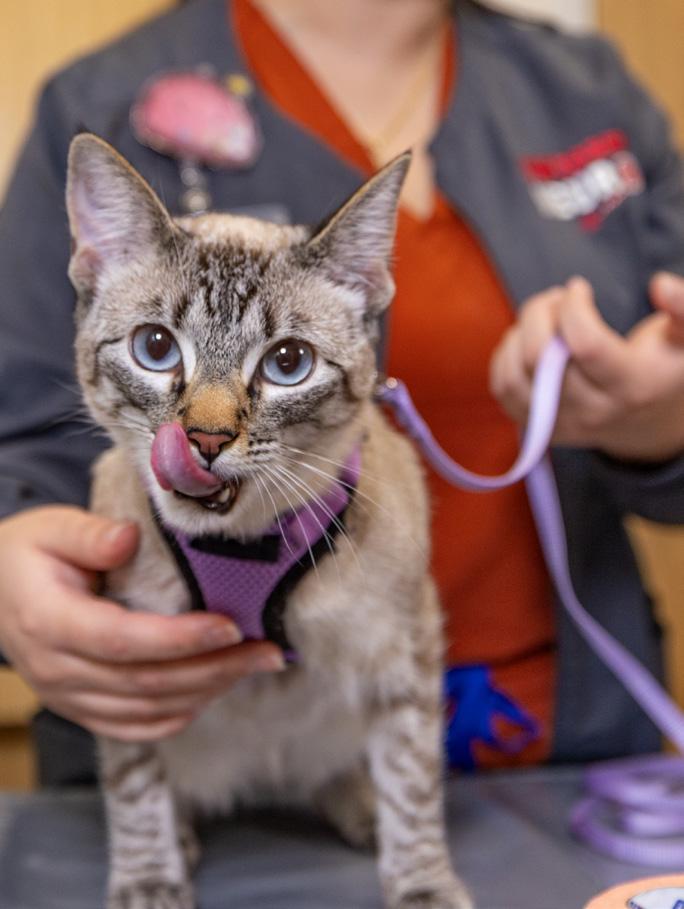
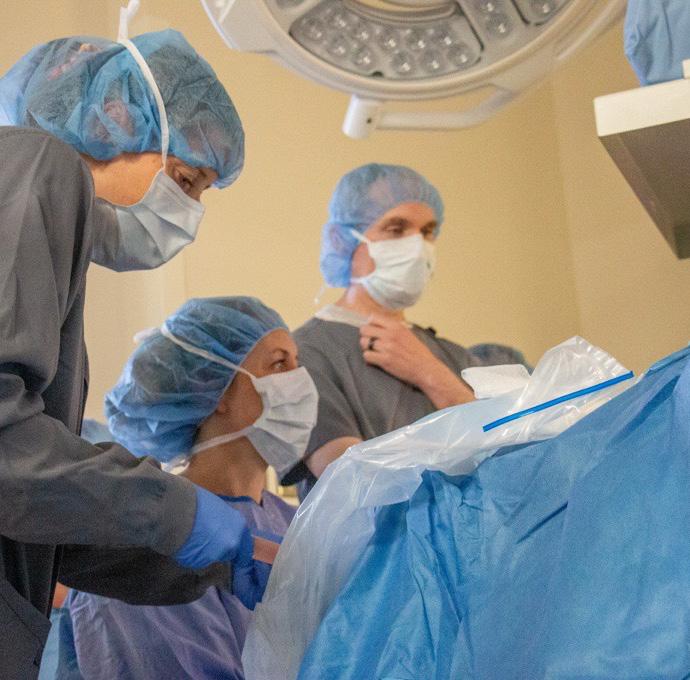
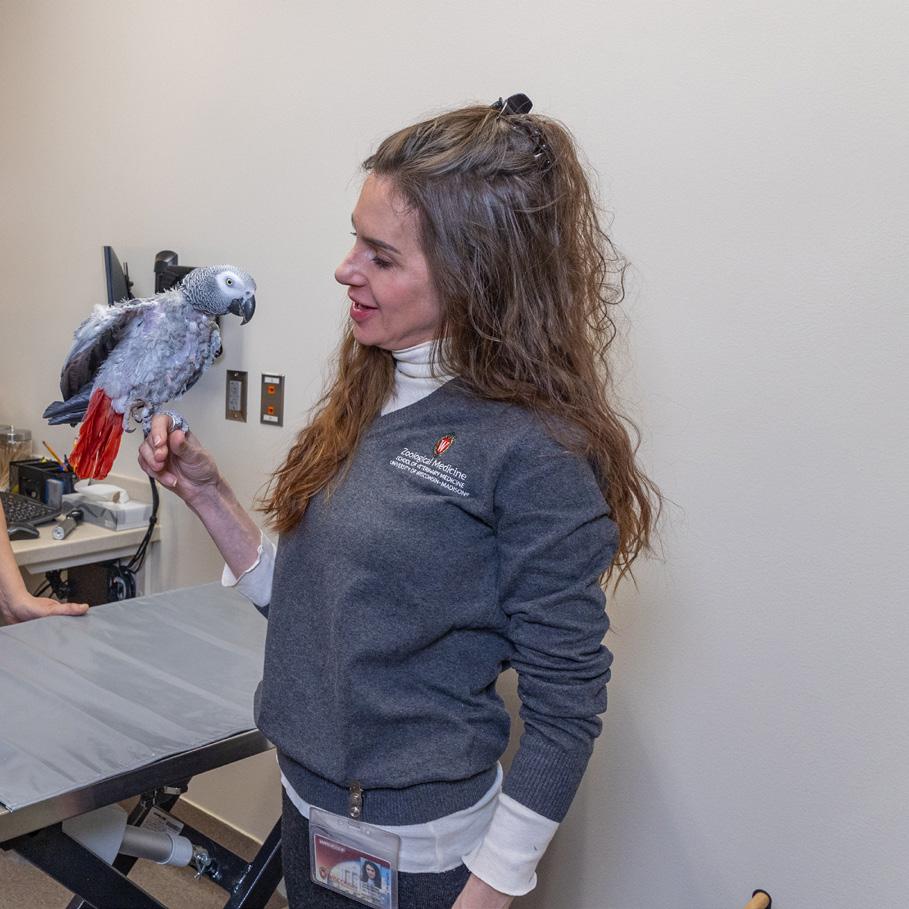
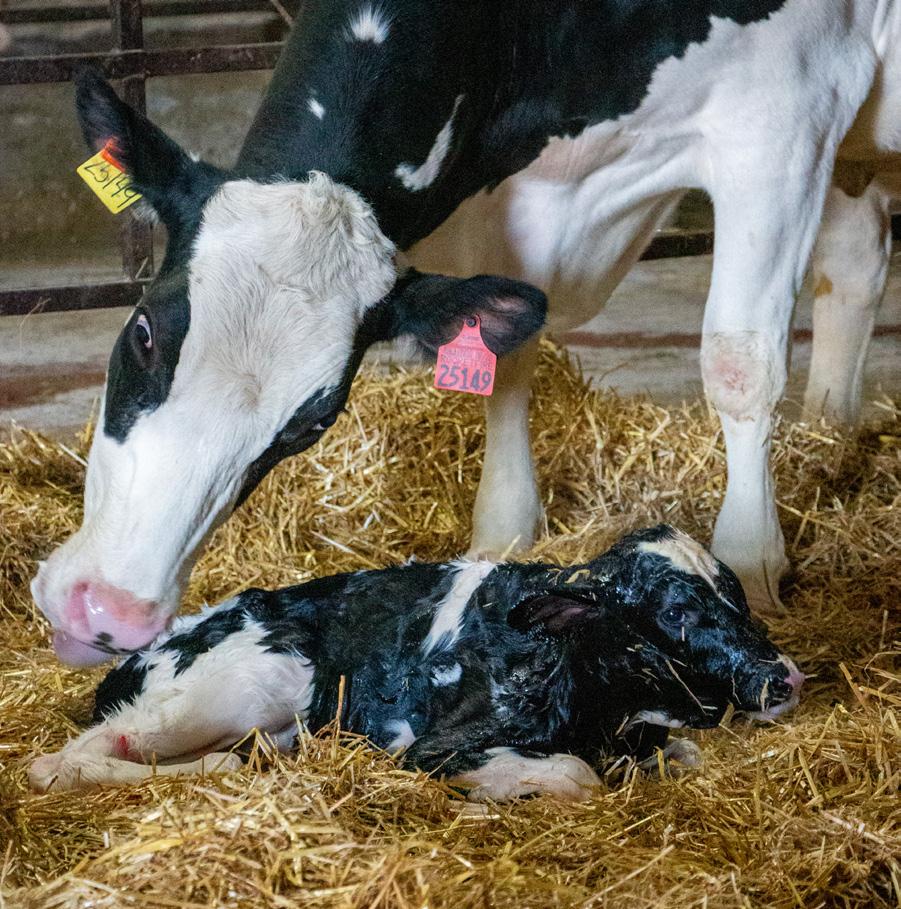
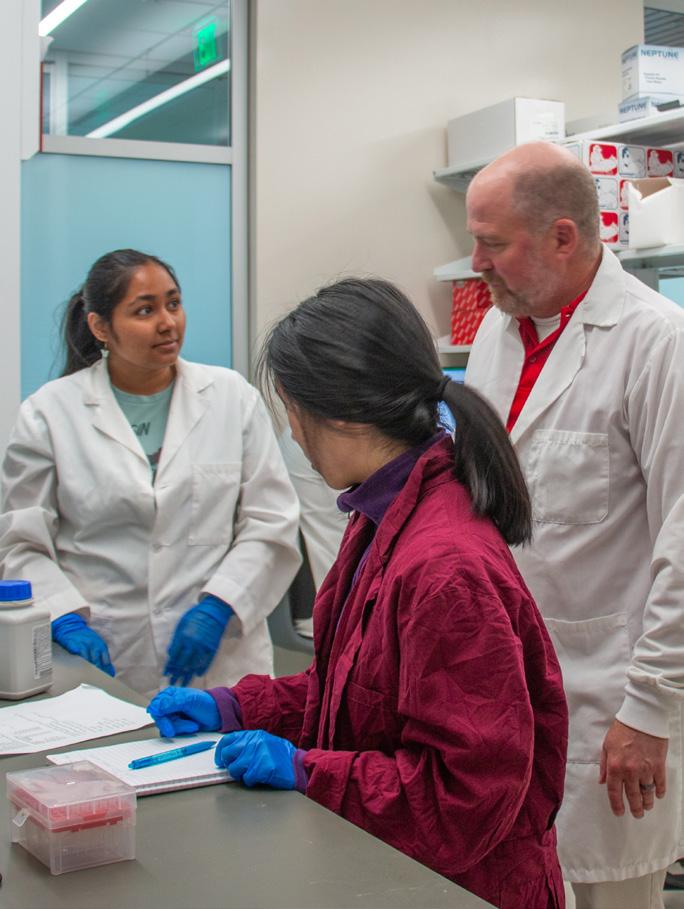







Just over a year into my tenure, I continue to be inspired by the incredible work of the students, faculty, and staff at the School of Veterinary Medicine (SVM) and UW Veterinary Care (UWVC).
We recently completed a new five-year strategic plan ( go.wisc. edu/svm2025 ), which will guide us into our next chapter. We’ve also been busy preparing for our Class of 2029 DVM students to get started: 100 students who are the first to engage with our new OnWard DVM curriculum, which is more clinically relevant, student-centered, and skills-focused to ensure our graduates are prepared to be successful practicing veterinarians on day one (see pages 6-7).
The SVM’s commitment to innovation is strong. Through UWMadison’s RISE initiative, which seeks to address significant challenges facing Wisconsin and the world, we’re recruiting exceptional new faculty, including experts in clinical and
JONATHAN LEVINE, DVM Dean
RICHARD BARAJAS, MIPA, MPH Manager of Outreach and Community Engagement
FARIBA KIANI, CPA Chief Financial Officer
LYNN MAKI, MA Ed
Associate Dean for Student Academic Affairs
NANCY PARKINSON
Assistant Dean for Human Resources
PEGGY SCHMIDT, MS, DVM
Associate Dean for Professional Programs
CHRISTOPHER SNYDER, DVM
Associate Dean for Clinical Affairs; Director, UW Veterinary Care
foundational sciences as well as artificial intelligence. These new positions will strengthen our academic community and expand our impact across research, education, and clinical service.
As always, in close collaboration with campus, civic and industry leaders, and elected officials, we navigate the ever-evolving funding and policy landscape. One thing remains certain: our SVM and UWVC communities and supporters are dedicated and staunch advocates for continued investment in our mission.
Until next time ... On, Wisconsin!
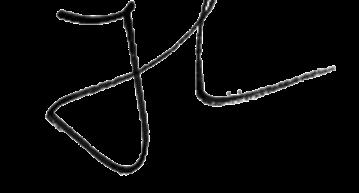
JONATHAN LEVINE
Dean, UW School of Veterinary Medicine
MARULASIDDAPPA SURESH, DVM, MVSc, PhD Associate Dean for Research & Graduate Training
KRISTI V. THORSON, MA Associate Dean for Advancement & Administration and Chief of Staff
LAUREN TREPANIER, DVM, PhD Assistant Dean for Clinical & Translational Research
The UW School of Veterinary Medicine uses gift funds to produce its publications. To donate to the school, contact:
HEIDI KRAMER
Senior Director of Development heidi.kramer@supportuw.org (608) 327-9136
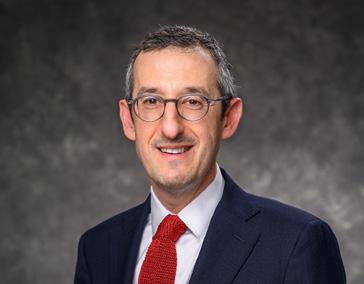

@UWVetMedDean
KRISTEN BERNARD, DVM, MS, PhD Pathobiological Sciences
NIGEL COOK, BSc, BVSc Medical Sciences
GILLIAN MCLELLAN, BVMS, PhD Surgical Sciences
CHAD VEZINA, PhD Comparative Biosciences
Editorial Staff
WRITING, EDITING
Maggie Baum, Jack Kelly
DESIGN, PRODUCTION
Lexi Swain
PHOTOGRAPHY
Seth Moffitt
1
in most active patents of any veterinary medical school or college, and number of patents per faculty member (Fundamental data provided by Academic Analytics)
5
18 veterinary medical school in the nation according to 2024 US News and World Report rankings
in the world
according to the 2024 QS World University Rankings

28 incoming students admitted in the Class of 2029 100
28,846 patients served at UW Veterinary Care

46

total research dollars: $46.3 million and extramural awards (federal and non-federal) 2024-25
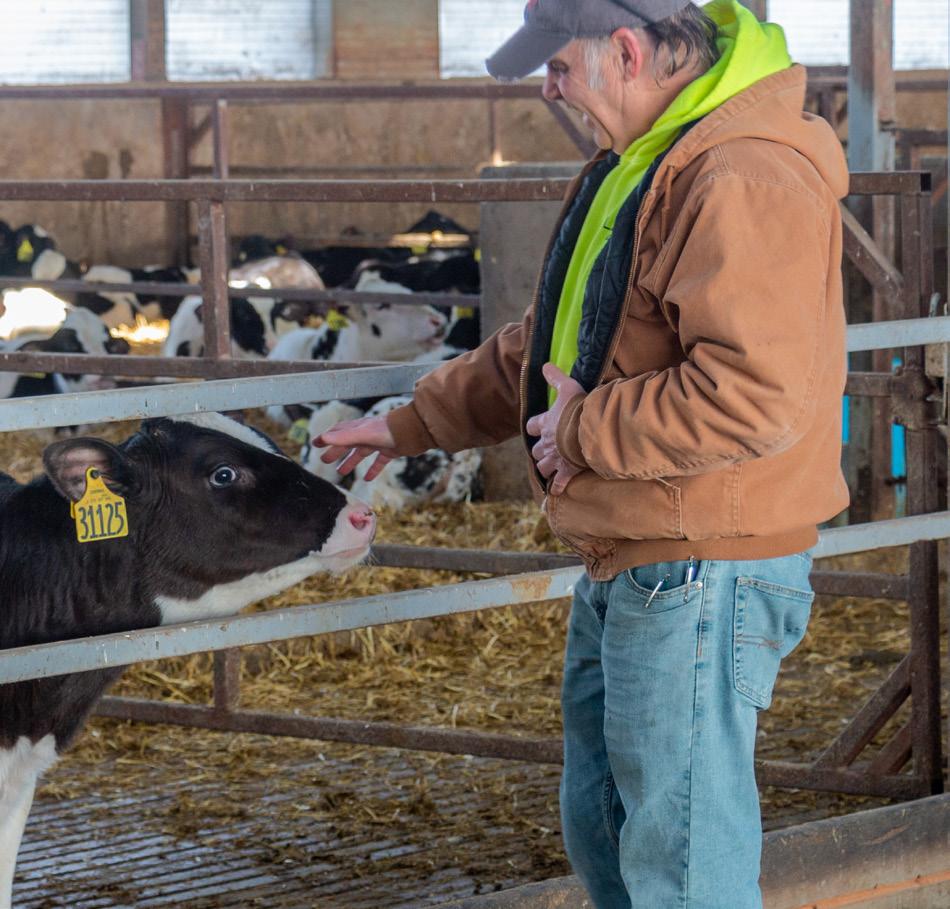

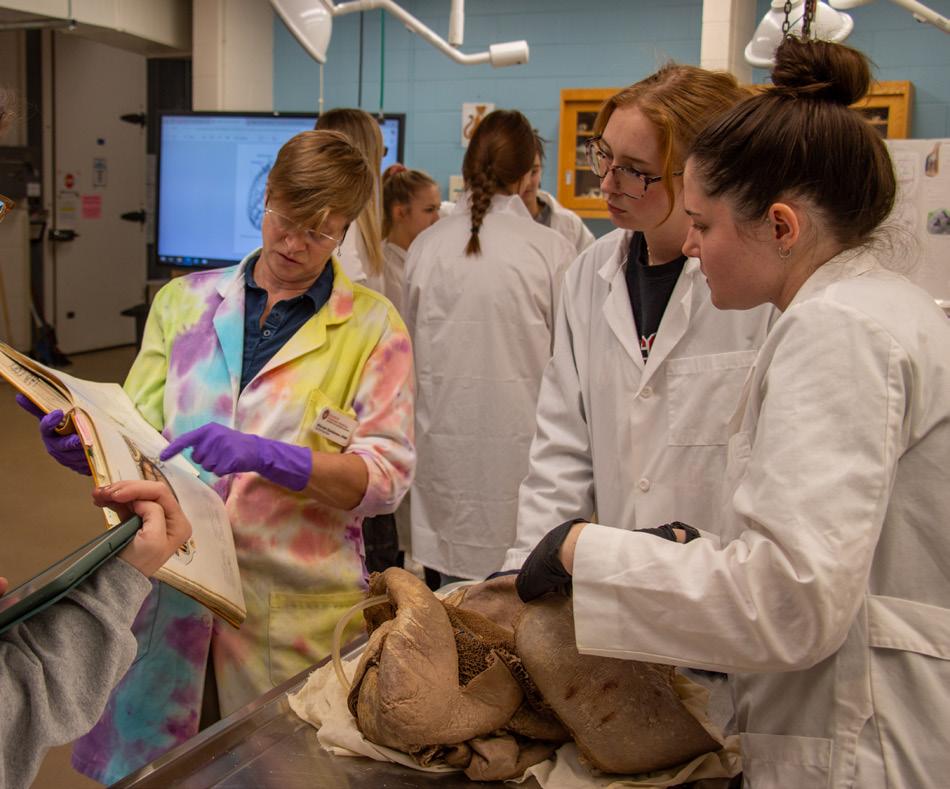
INNOVATION IN OUR... CLASSROOMS pg. 4-5
pg. 6-7
INQUIRY pg. 8-9
pg. 10-11
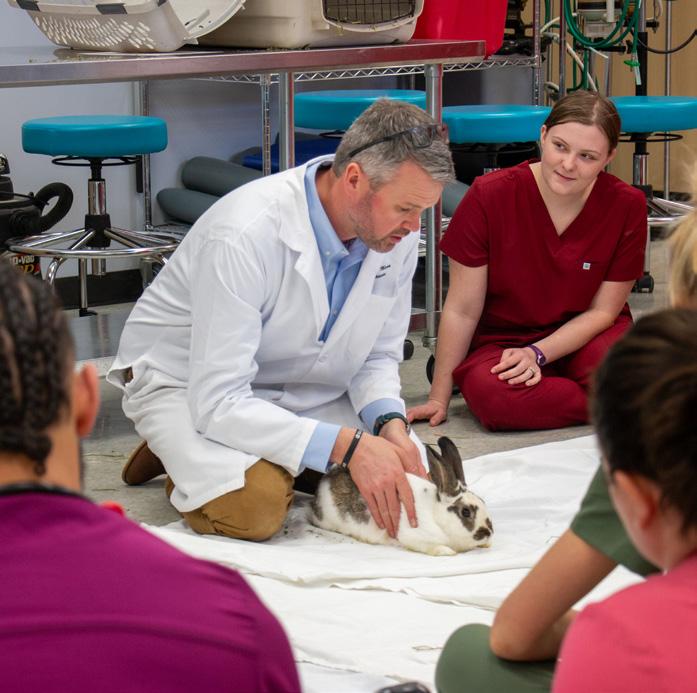
In fall 2025, a revised DVM curriculum will usher in a new era at the SVM, offering a more clinically relevant and skills-focused educational experience. The update reflects a faculty-led effort informed by data, research, and input from alumni, veterinary professionals, teaching specialists, and SVM educators. It ensures students are prepared to be successful practicing veterinarians on day one.
The new curriculum, known as OnWard, retains essential core content while transforming how that knowledge is delivered to a more systems-based structure that integrates foundational science with clinical concepts. Students will also encounter expanded opportunities for self-directed learning and real-world problem solving, and develop important professional skills, including communication and financial literacy.
Year two of the SVM’s Alumni-Student Mentor Program, designed to foster the personal and professional growth of DVM students, brought together 20 alumni-student matches (40 total participants) during the 2024-25 academic year. The matches were assigned based on similar career interests, and afforded students the chance to seek advice from a practicing veterinarian. Among the students who participated, 95% reported having a positive experience, according to follow-up surveys.
“It was a breath of fresh air to relate to a future colleague as a big sister figure instead of as a boss,” says mentor Kjerstin Jacobs (DVM’99).
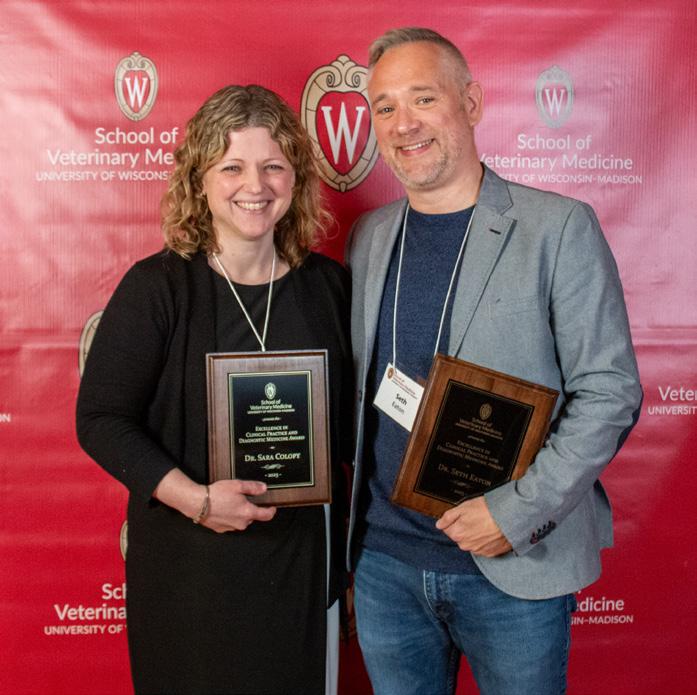

In April 2025, nearly 300 students, faculty, staff, and supporters gathered for the SVM’s annual Celebration of Excellence, made possible through the generosity of numerous donors and partners, to recognize outstanding accomplishments across education, research, clinical care, and service. Seth Eaton and Sara Colopy (Department of Surgical Sciences) were honored with an Excellence in Clinical Practice and Diagnostic Medicine Award. | Scan the QR code to view the full list of honorees.
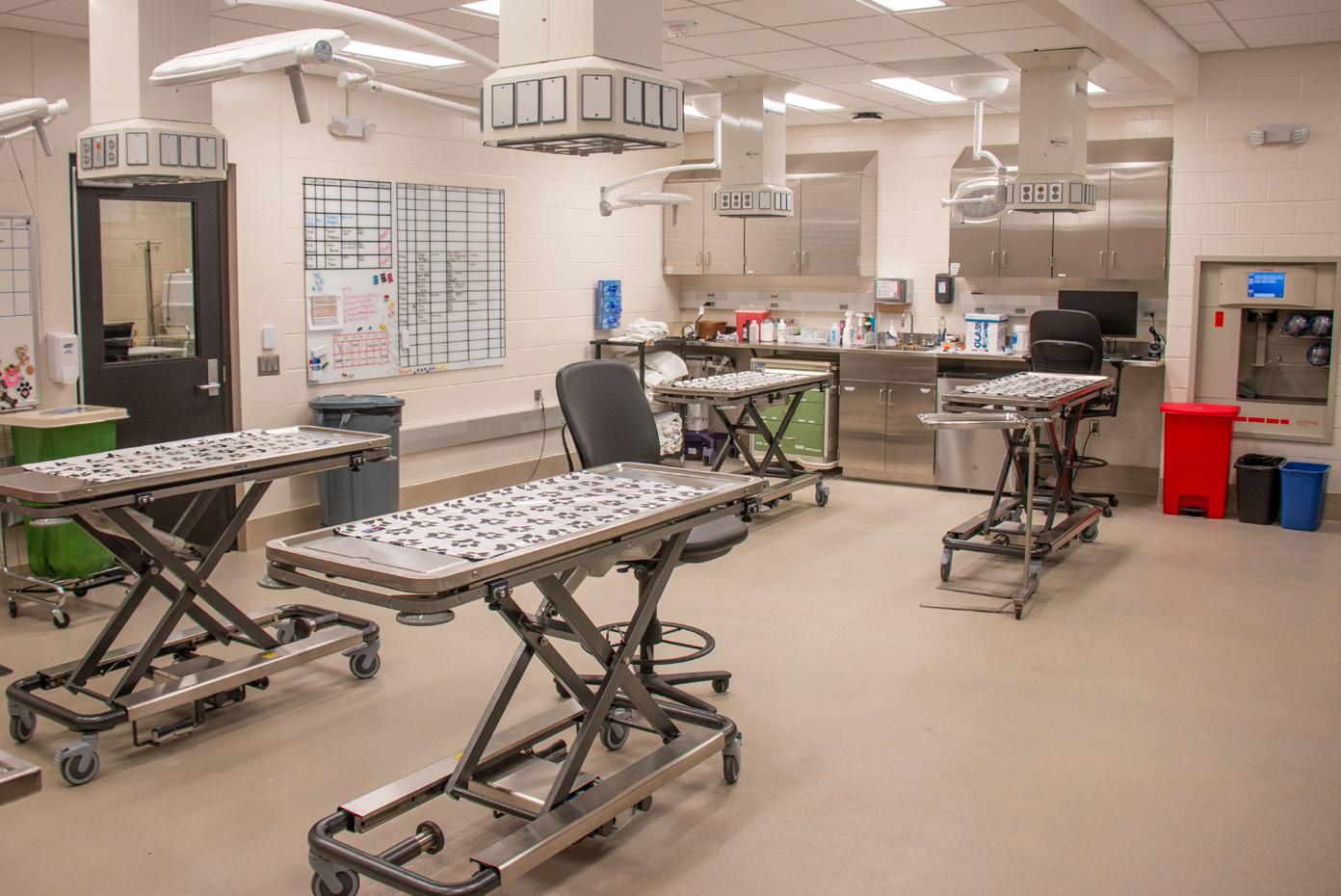
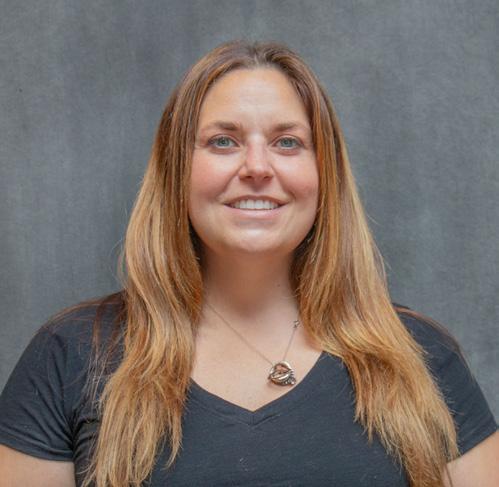
UWVC now offers PET-CT, redefining how diseases are diagnosed and treated. The technology, which has been used for years in human medicine, represents a major leap in diagnostics at UWVC, especially in oncology. The non-invasive, whole-body scan can detect disease earlier than traditional imaging and can help distinguish between benign and malignant masses. PET-CT also supports sports medicine for canine and equine patients by identifying injuries and monitoring recovery.
“PET-CT offers a unique opportunity for translational research, where breakthroughs in veterinary care can directly benefit both animals and people,” says Samantha Loeber (Department of Surgical Sciences), clinical associate professor of diagnostic imaging.
UWVC’s renovated oncology suite quadruples the space available for clinicians to see cancer patients and doubles the hospital’s space for chemotherapy treatment. The space houses the hospital’s new integrated oncology service, which brings together top-notch clinicians specializing in medical, radiation, and surgical oncology to provide comprehensive cancer care. The suite also offers more room for veterinary students, clinicians, and hospital support staff to interact and collaborate as they deliver best-in-class care for clients and their pets — efforts bolstered by Megan Mickelson (‘09 DVM’13, Department of Surgical Sciences), an alumna and former small animal surgery resident who recently joined the team and is one of just 68 fellows in surgical oncology recognized by the American College of Veterinary Surgeons.
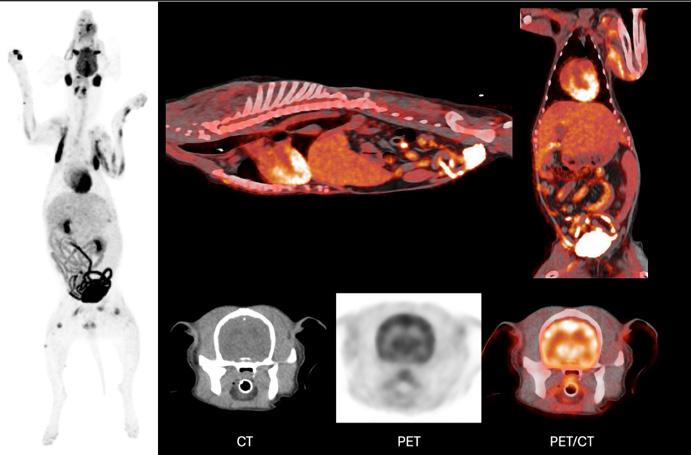
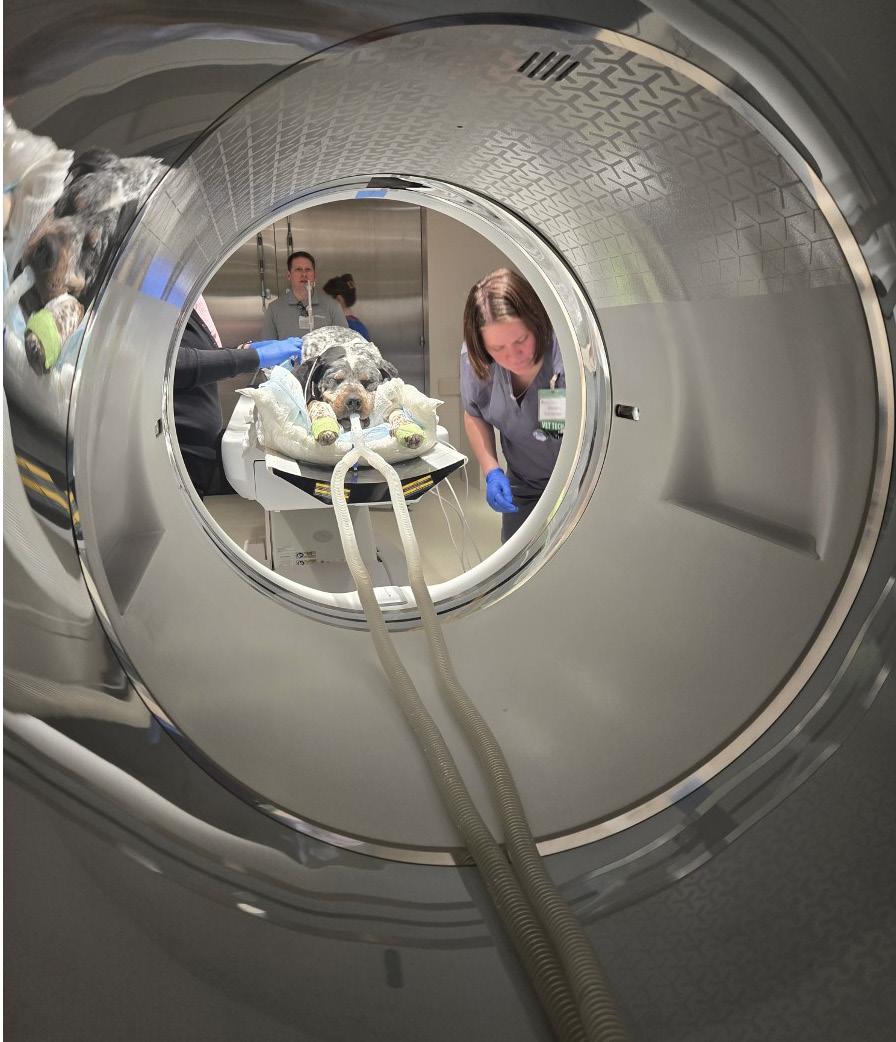



Five-month-old Roxy arrived at UWVC exhibiting signs of a heart defect. While she was too small for the traditional open chest surgery, Roxy became one of the first patients to benefit from a groundbreaking, minimally invasive heart procedure. UWVC’s cardiology team, led by Heidi Kellihan (Department of Medical Sciences), made a tiny nick in Roxy’s skin and, through it, placed a plug in one of her heart vessels. She went home without any sutures and recovered well.
Roxy’s innovative care was made possible, in part, by the Ryley Clinical Innovation Fund. Established in January 2025 by UW alumni Gary Schwager (’75) and Gabrielle Banick (PhD ’89), the fund supports learning opportunities for hospital clinicians, including mastering leading-edge technologies and travel to study new procedures. It honors the memory of the couple’s beloved Irish Setter, Ryley, and the care he received at UWVC.
The fund has enabled new treatments for nasal disease, orthopedic conditions, and fluid buildup around the lungs in dogs. It also fuels collaboration with peer institutions, helping UWVC remain at the forefront of clinical innovation.
“We don’t get to do these amazing things without this kind of buy-in from our generous supporters,” says Sonja Tjostheim (Department of Medical Sciences) of UWVC’s cardiology service.
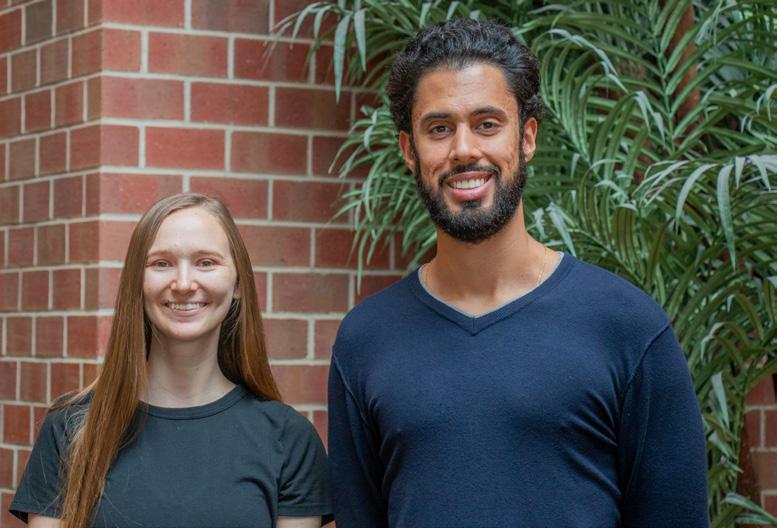
Students in the SVM’s Comparative Biomedical Sciences Graduate Program are helping to shape the future of veterinary medicine by integrating AI tools into clinical practice and education. Their efforts come as the SVM hires two additional AI-focused faculty members as part of UW-Madison’s RISE initiative.
Marlee Henige (DVM’23), a PhD candidate funded by an NIH T32 training grant, aims to use AI to allow veterinarians to make better-informed decisions in less time. Her research focuses on Digital dermatitis, a contagious skin infection associated with lameness in cattle. Henige is developing a real-time tool that uses DNA sequencing and computer vision to detect antimicrobial-resistant genes.
Fernando Valle (MSx’26) is using AI to detect lameness in beef cattle. Using top view images of beef cattle walking, he is training a model to predict lameness based on hundreds of variables. His work, funded by industry partners, aims to improve animal welfare and reduce economic burdens for farmers.
In December 2024, Gabriele Neumann (Department of Pathobiological Sciences) was named a fellow of the National Academy of Inventors. This prestigious recognition highlights her commitment to innovation and underscores the tangible impact her work has had on quality of life and the welfare of communities.
Neumann, alongside colleague and fellow National Academy of Inventors member Yoshihiro Kawaoka (Department of Pathobiological Sciences), revolutionized influenza vaccine development through their “reverse genetics” technique, enabling the creation of flu vaccines from engineered DNA.

Their work, supported in part by the Wisconsin Alumni Research Foundation (WARF), has streamlined global vaccine production and enabled a faster response to evolving influenza strains and other respiratory illnesses.
In 2007, Kawaoka and Neumann co-founded Madison-based FluGen, supported by WARF Accelerator, to prevent and treat influenza outbreaks worldwide.


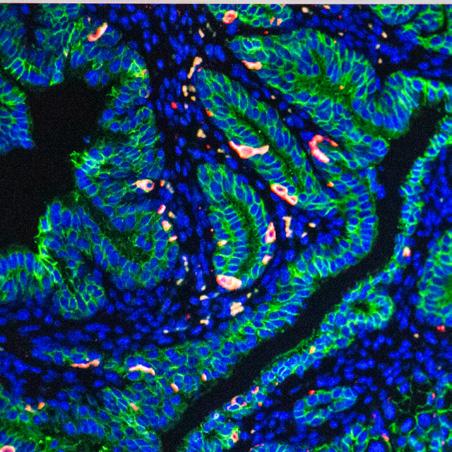

Urinary tract infections (UTIs) are increasing globally, with more than 400 million diagnosed in 2019. Led by Chad Vezina (Chair, Department of Comparative Biosciences), researchers at the SVM — a George M. O’Brien center for excellence studying benign urology — are exploring innovative ways to encourage the body to fight UTIs amid growing antibiotic resistance.
Their research reveals that bacteria entering the urethra causes certain cells to release serotonin, prompting the urethra to contract and expel “invading” bacteria. This discovery opens the door to using existing serotoninboosting drugs as potential treatments. The team also found that UTIs were linked to increased serotonin levels in urine, which means urine samples from UTI patients could be analyzed for serotonin levels rather than bacteria to allow for earlier treatment.
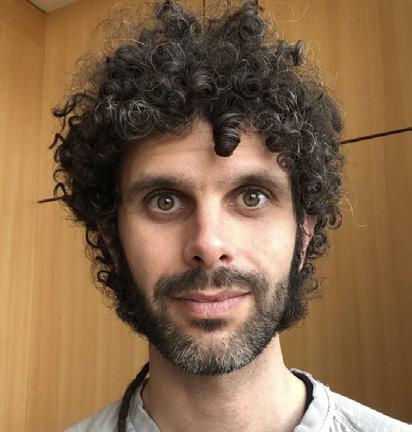
Marcos Isidoro-Ayza (PhD’25), working in the lab of UW-Madison Professor of Pediatrics Bruce Klein, uncovered how a fungus, which causes white-nose syndrome in bats, stealthily invades and manipulates bat skin cells during hibernation. His work was published and featured on the cover of Science in July 2024.

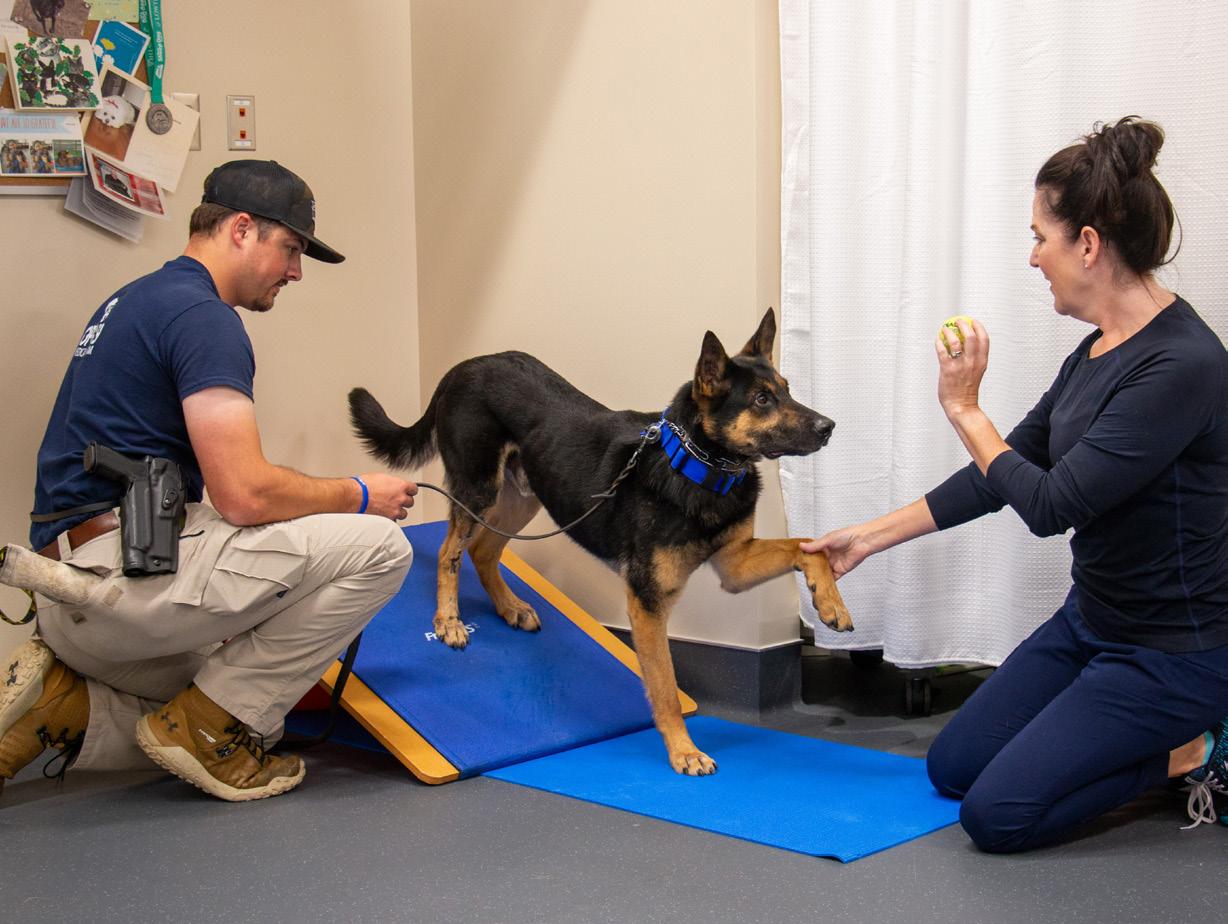
When K9 law enforcement officer Iro was critically injured in the line of duty, the SVM and UW Veterinary Care played a vital role in saving his life and supporting his recovery. After sustaining multiple gunshot wounds, Iro was rushed to Blue Pearl Pet Hospital in Appleton, Wisconsin. There, Ryan Demianiuk (DVM ’08) and Bruce Van Enkevort (DVM ’91) provided emergency care, while Rebecca Johnson (PhD ’02; Department of Medical Sciences) administered anesthesia during Iro’s initial life-saving surgeries.
After six tenuous days and multiple surgeries, Iro was discharged and, soon after, he and his handler, Deputy Blaine Evans, visited Courtney Arnoldy (’94; Department of Medical Sciences) at UWVC. Arnoldy led Iro’s extensive rehabilitation, focusing on mobility and strength. He has since been cleared to return to duty.
The generosity of SVM donors allows for a 50% discount on care for Wisconsin law enforcement animals, along with additional special credits for agencies in Dane County. Currently, more than 80 law enforcement agencies in the state have active agreements for discounted care at UWVC. | Read Iro’s full story at go.wisc.edu/iro.
The SVM fosters incredible outreach programs including The Dairyland Initiative (DI), a trusted resource offering researchdriven strategies to enhance dairy cow health and productivity to support an economically viable and competitive dairy industry. The program has both global impacts and influence close to home.
Larson Acres, an innovative Wisconsin dairy farm in Evansville, has been working with DI to utilize best practices for cow comfort, milk quality, farm sustainability, and more. One notable outcome of the partnership is the implementation of advanced ventilation and heat abatement systems in some of the farm’s barns – helping keep cows cool during hot Wisconsin summers. Since the collaboration started, Larson Acres has been recognized with prestigious awards for its milk quality and increased milk production by 15%. The partnership between Larson Acres and DI demonstrates how collaboration, innovation, and science has transformed dairy farming.

Spectrum News One Wisconsin featured the SVM’s WisCARES clinic (Wisconsin Companion Animal Resources, Education, and Social Services) in their Everyday Hero series, which celebrates individuals and organizations making a difference in their communities. The story highlighted how WisCARES provides veterinary care, housing support, and social services to pet owners experiencing homelessness or financial hardship, and offers a valuable clinical rotation experience for SVM students.
The story included insights from Kelly Schultz (’05 MS’11 DVM’15), medical director at WisCARES, thenstudent Elizabeth Morrow (DVM’25), veterinary assistant Kiera Christensen, social worker Aubrey Tesch, and others working to preserve the humananimal bond during challenging times.
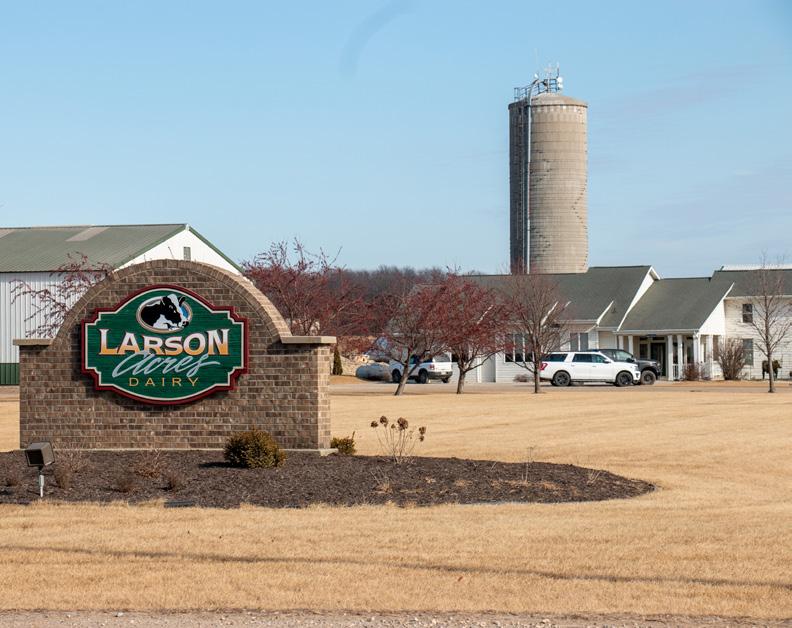

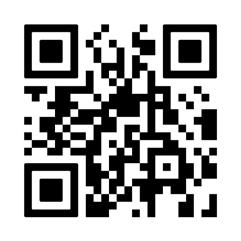
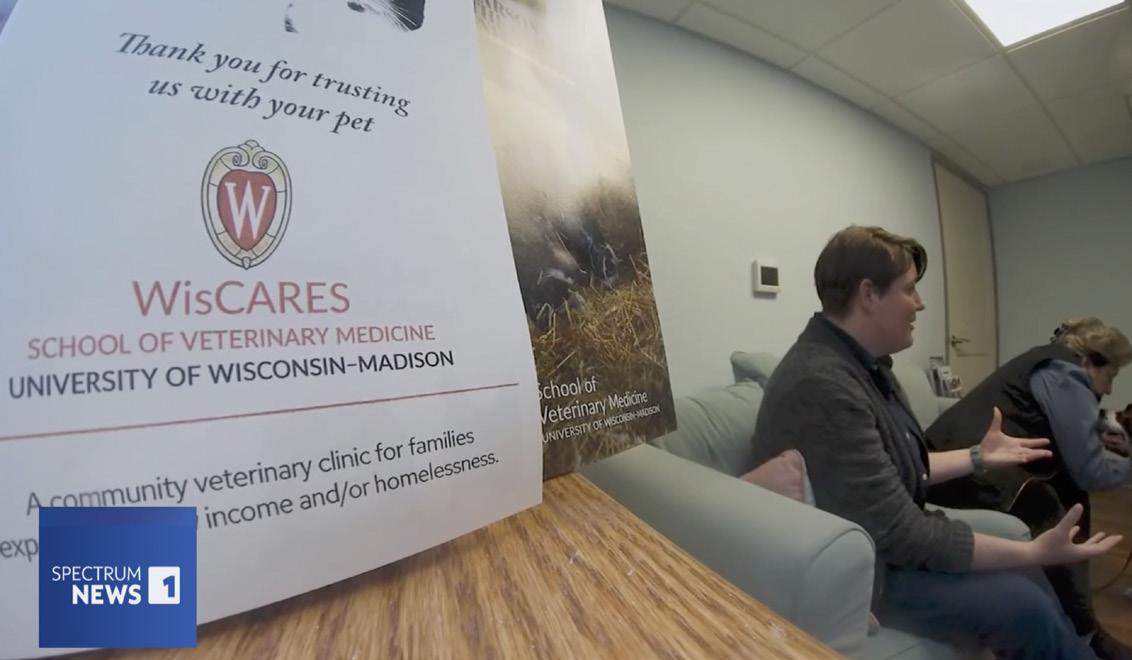
WisCARES also received a transformative $2.18 million grant from Maddie’s Fund®, a national foundation dedicated to improving the well-being of companion animals, to support clinic expansion, enhanced services, and increased student training opportunities.
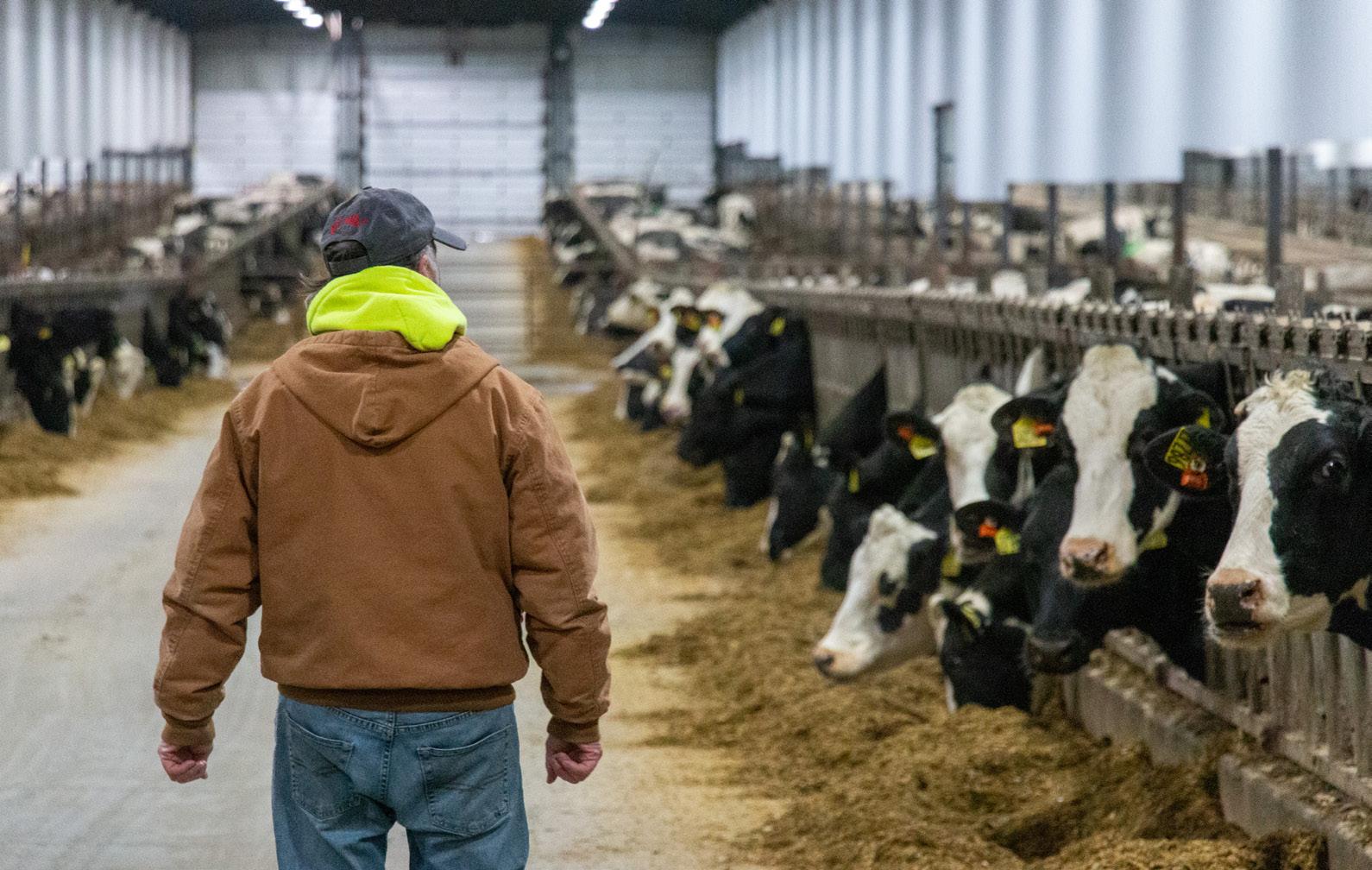
Since 2010, the Food Animal Veterinary Medical Scholars (FAVeMedS) program has helped cultivate the next generation of food animal veterinarians. The highly selective initiative identifies and facilitates mentorship of first-year undergraduate students who show qualifications and motivation in the field.
In collaboration with faculty from UW-Madison and other UW System schools rich in animal, biomedical, and veterinary sciences, up to four students are admitted each year, with preference given to Wisconsin residents. Participants are conditionally granted admission to the SVM’s DVM program after three years of undergraduate studies, pending successful completion of rigorous academic, research, and mentored clinical experiences. A notable 83% of program graduates have pursued careers in food animal practice across Wisconsin.
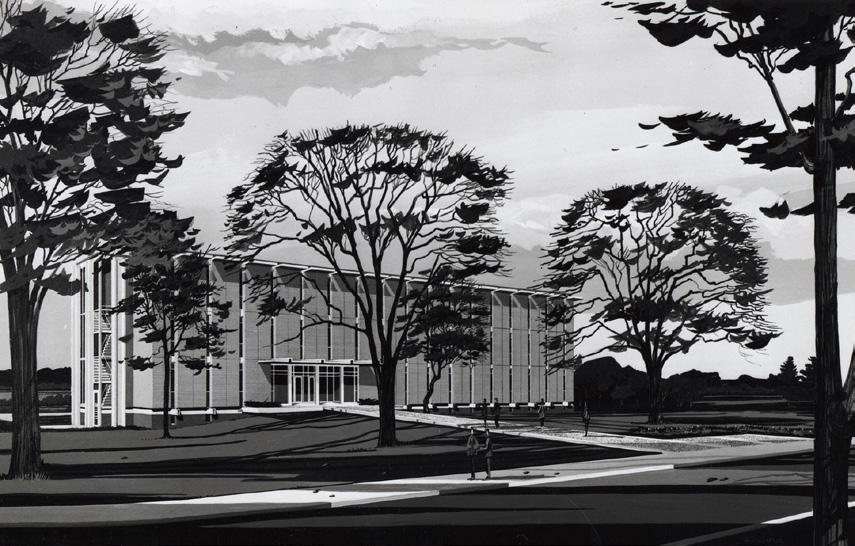
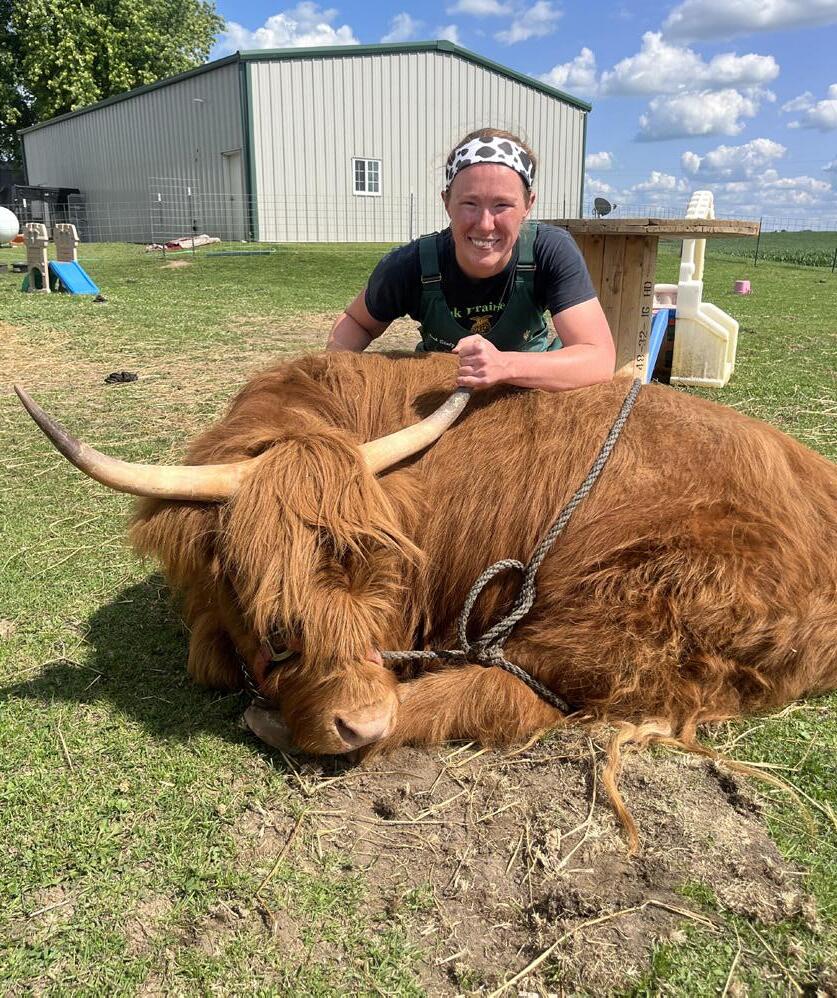
The program provides structure for gaining useful experience prior to entering veterinary school. Leah Secord (DVM’22), an alumna of the program
The Wisconsin Alumni Research Foundation (WARF), a key partner of the SVM, celebrated its 100th anniversary in 2025. “WARF’s growth over the past century shows the power of engaging faculty in the process of commercializing their ideas and protecting their intellectual property,” says Dean Jonathan Levine.
In 1959, WARF gave $475,000 to help build UW-Madison’s first Veterinary Science Building; in 2020, it provided $15 million for the SVM’s new animal hospital and research center.
WARF collaborates with SVM inventors to patent and license their intellectual property. For example, emeritus medical physics professor Rock Mackie worked with the SVM’s Mark Markel and Peter Muir to produce the Equina® technology. Later patented by WARF, Equina was the basis for Asto CT stand-up imaging for horses (see graphic below). A significant benefit of stand-up scanning is that animals can be sedated rather than fully anesthetized. In addition, the scans provide veterinarians with accurate imaging of structural problems in horses’ legs while they are bearing the full weight of their bodies, something previous technology could not do.
To read more about the SVM’s partnership with WARF, visit go.wisc.edu/svm-warf.
Asto CT recently surpassed a major milestone for its Equina® technology: 10,000 patient scans. Since its first installation at UW-Madison, Equina® has now been furnished at 10 other institutions across multiple continents.
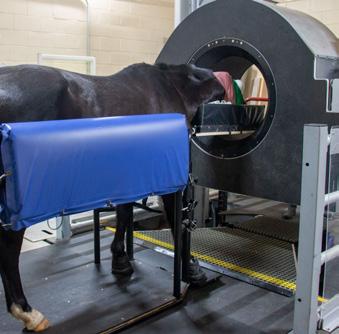
3,647
2,925 TOTAL
$74,260
The SVM’s Board of Visitors serves as an external advisory body to the dean. Members have experience and expertise both in the veterinary medical field and beyond. Their sound advice and counsel is invaluable in advancing the broader mission of the school and in helping move specific initiatives forward.
Tom Bach BBA’86, DVM’94* Madison, Wisconsin
Nancy Ballsrud MBA’75 Minneapolis, Minnesota
John Baumann ’82 Monroe, Wisconsin
Debbie Cervenka Santa Rosa Beach, Florida
Margo Edl Middleton, Wisconsin
Charity Gottfredsen ’02, MS’07, DVM’07* Chicago, Illinois
Dan Grimm MA’23 Waterford, Wisconsin
Pam Jahnke Madison, Wisconsin
Carlton Jenkins MS’93, PhD’09 Owens Cross Roads, Alabama
Phil Jennings JD’93 Madison, Wisconsin
Kim Kratt DVM’00* La Crosse, Wisconsin
Diane Larsen ’80, DVM’90, PhD’99* Duluth, Georgia
Jane Mandula ‘86 Lakewood Ranch, FL & Canton, GA
Linda Nelson ‘82 Madison, Wisconsin
Jeffry A. Neuenschwander ’82 Detroit, Michigan
Suzy Shain BS’87, MBA‘90 Verona, Wisconsin
Karl Solverson ’94, DVM’99* Westby, Wisconsin
Karen Walsh ’81, MA’89 Madison, Wisconsin
Jeff Wiesner ‘83 Madison, Wisconsin
Ewan Wolff, DVM’11* Portland, Oregon
Jeffrey R. Zuba ’81, DVM’87* San Diego, California
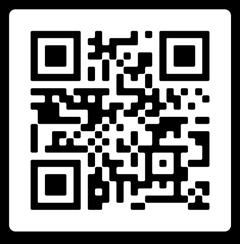
We greatly appreciate the contributions of the SVM’s Alumni Advisory Board, which enhance the school’s support of and relationship with alumni by providing input on alumni-related activities, communications, and opportunities for engagement. | Visit go.wisc.edu/svmaa for more information.
Tom Bach BBA’86, DVM’94
Holly Hovanec DVM’18
Diane Larsen ’80, DVM’90, PhD’99
Jennifer Lorenz DVM’09
Debra Olbrich DVM’07
Brad Poff DVM’87
Kathy Reilly DVM’90
Ann Sherwood Zieser DVM’90
Ty Vannieuwenhoven DVM’89
Scan to read more about our members
All degrees listed are earned from UW-Madison.
* Indicates alumni of the UW School of Veterinary Medicine.
The following is not an inclusive list, but highlights of recognition and accolades received by students, faculty, and staff between July 1, 2024 – June 30, 2025.
Lyric Bartholomay (Dept. of Pathobiological Sciences) Fellow, American Society of Tropical Medicine and Hygiene
Allysa Fogarty (PhD student, Dept. Comparative Biosciences) Zoetis Award for Research Excellence
Tony Goldberg (Dept. of Pathobiological Sciences) Distinguished Primatologist Award, Midwest Primate Interest Group
Karen Hershberger-Braker (Dept. of Pathobiological Sciences) 2024 Veterinary Support of the Year, Dane County Humane Society
Kim Keil Stietz and Chad Vezina (Dept. of Comparative Biosciences) CAIRIBU Interactions Core Collaboration Award, Collaborating for the Advancement of Interdisciplinary Research in Benign Urology
Erin Lashnits (Dept. of Medical Sciences) Inductee, National Academies of Practice
Leah Owens (PhD’23, DVM’25) Merck Student Innovation Award, American Veterinary Medical Foundation
Gabriele Neumann (Dept. of Pathobiological Sciences) Fellow, National Academy of Inventors
Kazuya Oikawa (Resident, Ophthalmology) Research Excellence by a House Officer, Zoetis
Lauren Trepanier (Dept. of Medical Sciences) 2025 Faculty Achievement in Research Award, American Association of Veterinary Clinicians
Lyric Bartholomay (Dept. of Pathobiological Sciences) Board member, American Heartworm Society
Becky Johnson (Dept. of Surgical Sciences) President, Wisconsin Veterinary Medical Association
Heidi Kramer President, Association of Veterinary Advancement Professionals
Mark Markel (Dept. of Medical Sciences) President, AO Foundation
Peggy Schmidt Three-year term, Board of Governors of the Academy of Veterinary Educators
Christopher Snyder (Dept. of Surgical Sciences; Director, UW Veterinary Care) President, American Veterinary Dental College
Liddy Alvarez (Dept. of Medical Sciences) Ruth M. Skaar Chair in Veterinary Medicine
Lyric Bartholomay (Dept. of Pathobiological Sciences) Dr. Bernard C. Easterday Professorship in Infectious Disease
Johanna Elfenbein (Dept. of Pathobiological Sciences) Walter and Martha Renk Chair for Preharvest Food Safety
Yoshihiro Kawaoka (Dept. of Pathobiological Sciences) Wisconsin Alumni Research Foundation (WARF) Professorship Fund in Recombinant Influenza Viruses
Gillian McLellan (Dept. of Medical Sciences) Tim and Nancy Speaker Chair in Canine Health
Marulasiddappa Suresh (Dept. of Pathobiological Sciences) John E. Butler Professorship in Comparative and Mucosal Immunology
John Svaren (Dept. of Comparative Biosciences) Boespflug Family Professorship in Myelin Biology
Leandro Teixeira (Dept. of Pathobiological Sciences) Richard R. Dubielzig Professorship for Comparative Ocular Pathology
Lauren Trepanier (Dept. of Medical Sciences) Melita Grunow Family Professorship in Companion Animal Health
David Vail (Dept. of Medical Sciences) Barbara A. Suran Chair in Comparative Oncology
2015 Linden Drive
Madison, WI 53706
Published by The University of Wisconsin-Madison School of Veterinary Medicine 2015 Linden Drive Madison, WI 53706
(608) 263-6716




